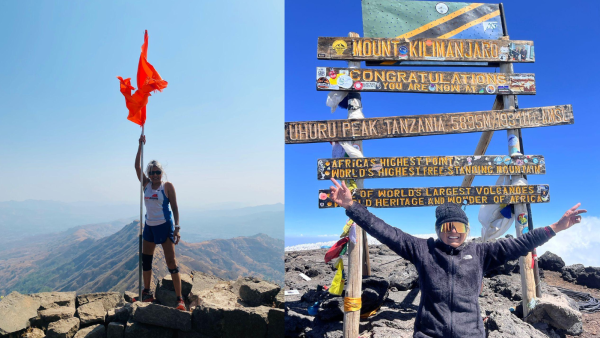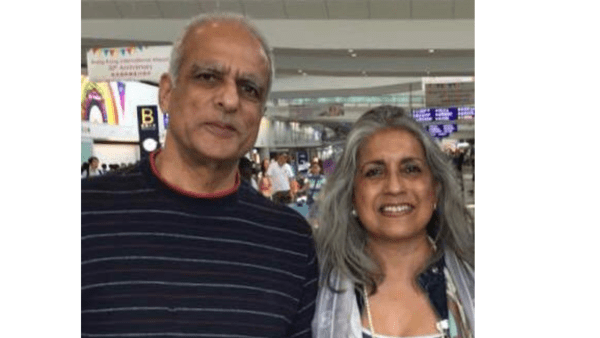On the eve of Independence Day this year, a team of seven climbers was at the base of Mount Kilimanjaro, the highest peak in Africa. None of them doubted that they would be able to make the arduous climb and hoist the tricolor to the summit on August 15th. The oldest of them was Anjali Hazari, 68, who was confident that all she needed to do was put her foot down. in front of the other. It might take some time and she might be slow, but she would get to the top. And she did.
That’s exactly how she navigated her life too.
On the phone from Hong Kong, where he has lived for 40 years, Hazari speaks quickly. She says she also walks fast. “It has always been important to me to live a productive and purposeful life. Time is life. I often think that people don’t make the connection between time and life. I see people living their lives as if it were a dress rehearsal for the final act. In fact, as I get older, I am acutely aware of the limited time I have,” she says.
 Anjali Hazari on Mount Kilimanjaro in Africa. (File photo)
Anjali Hazari on Mount Kilimanjaro in Africa. (File photo)
In June 2024, a Lancet study covering 197 countries and a period of 2000-2022 revealed a high percentage of physical inactivity among Indian adults, with a striking gender gap – 52.6 percent women as opposed to 38.4 percent of men. Hazari says that, at least in Pune, where she also has a home, she sees hopeful signs of change.
“There seems to be a greater awareness among older women about the need to exercise. I see this every time I visit Pune every two months. But the affluent lifestyle in India seems to impede mobility. We clearly don’t like walking. I find it extremely strange that Indians spend so much money on fancy cars, clothes and shoes, i.e. abroad. They seem to invest little in the quality of their own bodies, which they cover with sarees and expensive jewelry,” says Hazari.

She also noted that exercise for older women in India involves walking in parks, running tracks or gyms. “But as we age, there is a need to also incorporate weights to maintain bone density and muscle mass and yoga/Tai chi/Pilates to maintain joint mobility and flexibility. Fighting the stiffness that builds up in the body and mind as we age is a constant challenge. It’s something older Indian women seem hesitant to tackle,” she says.
Locus of control
Growing up, Hazari received little support or opportunity to develop her innate abilities. She enjoyed everything related to biology, playing table tennis and writing. “After completing Interscience at Elphinstone College, I joined Grant Medical College Mumbai in 1974. Those years were easily the worst period of my life. I failed practical physiology classes. During this time, my mother died by suicide. The frustration I experienced was criticized and used as a justification to denigrate my intellectual capacity and my medical school fees were not paid”, he states. A change in the educational system made it almost impossible for her to be admitted even to the bachelor’s degree. “I wasn’t irritated at all, I had a huge shoulder block,” she says.
Her locus of control to get her life back was initially external, to prove that she deserved better. Interestingly, the four-brand slogan gave it a philosophical strength. These were – “What can be imagined can be achieved”, “Quality of life is your choice”, “Life is not a spectator sport” and “Just do it”.
Hazari stopped feeling sorry for herself and educated herself. She became a biology teacher at international schools in Hong Kong and had a very rewarding career. She received Stanford University’s Teaching Excellence Award and was nominated for the highest award given by the Hong Kong government, the Chief Executive Award for Teaching Excellence.
 Anjali and her husband. (File photo)
Anjali and her husband. (File photo)
She has a column in South China Morning Post and writes extensively about educational policy and practice. “Somewhere along the way, my locus of control shifted inward. We owe it to ourselves to take advantage of every opportunity that arises to realize our innate abilities. I gave myself opportunities to study, write and exercise. I don’t think I’ve ever been as happy and content as I am today,” she says.
Early start
Hazari played table tennis at school, university and state when he was in college. “At the beginning of my childhood, I lived with my grandparents. They were farmers living in Amravati. Drawing water from the well, making rangoli and chanting prayers were all done before I went to school,” she says.
She started running after she got married. “My husband was then captain of a merchant ship. Often, marine terminals were located far from urban areas. I would run to the city center and back because taxi fares were expensive,” she says. Moving to Hong Kong gave her the impetus to continue running regularly, inspired not only by the parks and other public spaces, but also by the Chinese work ethic, discipline and active lifestyle.
Her childhood years were formative, as Hazari, after she became a mother, was able to work out in the morning before waking her children up. Running became his metaphor for life and living. “For me, the only bad workout is the one that doesn’t get done,” she says.
Mom is the word
Like many working mothers, Hazari has always had a long to-do list. Then, as a runner, she started skipping critical warm-ups and strengthening exercises. The result was many injuries, including meniscus tears.
“I needed two arthroscopies on my right knee and one on my left. Treatment in the 1980s, 90s, and early 2000s consisted of trimming the meniscus rather than repairing it, as is the norm today. As a result, I now have osteoarthritis in both knees, which put an end to my running career after I gave myself a birthday present by scoring 60 runs by my 60th birthday,” she says.
That’s how Hazari started trekking in the hills of Hong Kong. She has climbed the 100km Maclehose trail in Hong Kong, Kang Yatze II in Ladakh and Kota Kinabalu in Malaysia, among others. “I’m convinced that Gibran wrote this for me: “And don’t forget that the earth delights to feel our bare feet and the winds long to play with their hair,” she says. Hazari traveled all over Hong Kong and climbed several peaks.
Exercising is a way of life for your family, including your son and daughter. “Not only has this given us good health and allowed us to be more disciplined, but it has also improved our time management skills,” she says.
Hazari is now writing a book and plans to climb many of the seven summits. “My mountaineering journey has just begun. I’m extremely excited about where this will all take me. I will climb Mount Aconcagua in January 2025. I hope to also climb Mount Elbrus, the highest summit in Europe. If my knees allow, I will, like The Sound of Music, climb every mountain,” she smiles.
#odds #childhood #rural #Amravati #mothers #suicide #interrupted #medical #study #didnt #stop #Anjali #Hazari #living #dream #life #Hong #Kong
